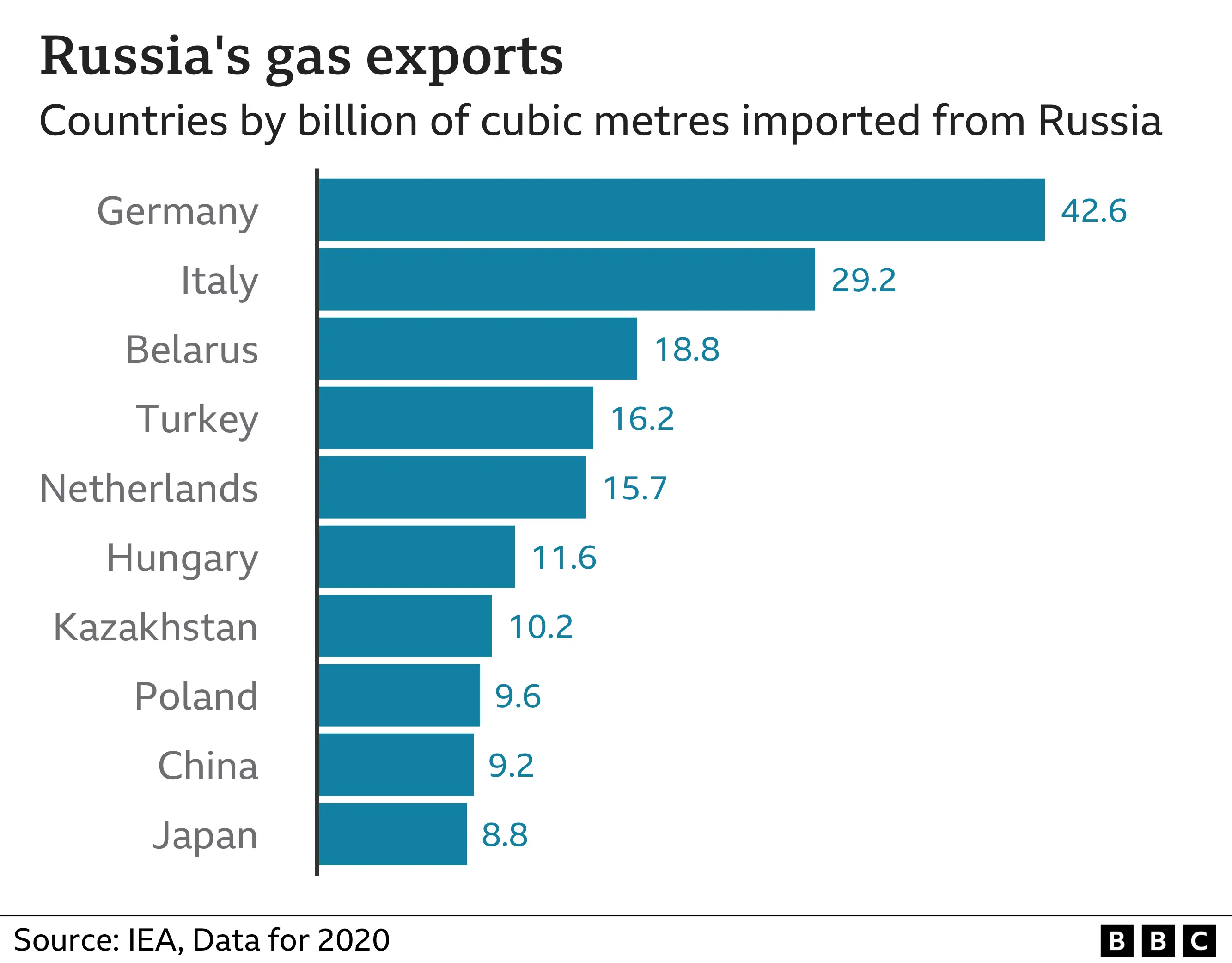EU divided over how to step away from Russian energy
 Getty Images
Getty ImagesEuropean Union countries are split on how soon they wind down dependence on Russian energy supplies.
While sanctions have been applied to other areas of business, the EU remains heavily reliant on Russian oil and gas.
Germany's economic minister said the country would be able to weather a Russian oil ban by the end of 2022, as he appeared to back tougher sanctions.
However, Hungary has said it opposes such a move, stating it would not back measures that could endanger supplies.
EU ministers met on Monday to discuss how to manage the situation, under intense pressure to reduce the revenue stream supporting President Vladimir Putin's war in Ukraine.
There are two main challenges faced by members states - how to pay for Russian energy in a way which doesn't breach or undermine EU sanctions, and also how to source and develop alternative supplies to move away from reliance on Russia.
Europe's reliance on Russian energy
At a press conference on Monday, the EU's energy policy chief Kadri Simson said Russia halting gas supplies to Poland and Bulgaria had strengthened the bloc's will to become independent of Russian fossil fuels.
But according to the Centre of Research on Energy and Clean Air (CREA), the EU has imported about £37bn worth of fossil fuels since the conflict began. The two largest importers worldwide were Germany followed by Italy.
Energy giant Gazprom stopped gas exports to Poland and Bulgaria last week after those countries refused to comply with Russian demands to switch to payment in roubles, and many other member countries are set to face the same issue around mid-May.
Poland and Bulgaria had planned to stop using Russian gas this year and say they can cope with the stoppage, but it has raised fears that other EU countries, including Europe's gas-reliant economic powerhouse Germany, could be next.
Ms Simson repeated the European Commission's view on Monday that paying for gas in roubles would be a "violation" of sanctions and "cannot be accepted."
She said member states were building up gas storage supplies before winter.
Nathan Piper, head of oil and gas research at Investec, told the BBC it was "pretty clear" that the EU wanted to "pivot away" from Russian oil and gas, but added the lack of unity was being caused by the "ability to actually make that happen".

Europe gets about 40% of its natural gas from Russia, which is also the bloc's main oil supplier, but some countries are more dependent Russian fossil fuels than others, so sudden supply cuts could have huge economic impact.
For example, Germany currently gets about 25% of its oil and 40% of its gas from Russia, Slovakia and Hungary received 96% and 58% respectively of their oil imports from Russia last year, according to the International Energy Agency.
Germany's economic minister Robert Habeck said his country had "managed to reach a situation where Germany is able to bear an oil embargo" and was "on course to do the same for gas".
"Other countries need a bit more time," he added.
Diplomatic sources told the BBC that compromises to a complete bloc ban were being looked at, particularly for countries such as Hungary and Slovakia.
'Finding new oil suppliers easier than gas'
Mr Piper said with oil, there were more options to get alternative supplies, compared to gas, which is transported most commonly through pipelines.
He added it is also "trickier" for landlocked EU states to find new sources.
He also warned while Germany might move to ban oil, switching off its Russian gas - which makes up 40% of its total imports - would "take them years".
"Russia could go 'if you want to go after our oil, how about we reduce our gas'," he added.
"They could push up the price, reduce the volumes. They have a lot of bargaining power."

Elsewhere, energy research institute EWI said Germany should limit gas use now to prepare for the possibility of a future cut-off from Russia.
Uniper, one of Germany's biggest energy firms, also warned an EU ban on Russian oil could prompt Russia to halt westward gas flows.
Roubles row causing confusion
The company said last week it would pay in euros which will be converted into roubles, meeting the Kremlin's demand for all transactions to be made in the Russian currency.
"We consider a payment conversion compliant with sanctions law and the Russian decree to be possible," a spokesman told the BBC.
Other European energy firms are reportedly preparing to do the same amid concerns about supply cuts.
In late March, Russia said "unfriendly countries" would have to start paying for its oil and gas in roubles to prop up its currency after Western allies froze billions of dollars it held in foreign currencies overseas.
Under the decree, European importers must pay euros or dollars into an account at Gazprombank, the Swiss-based trading arm of Gazprom, and then convert this into roubles in a second account in Russia.
The majority - 97% - of EU companies' gas supply contracts with Gazprom stipulate payment in euros or dollars.
Some countries are looking to turn to liquified natural gas (LNG), with the US agreeing to ship an additional 15 billion cubic metres to Europe by the end of the year.
The US has already banned Russian oil imports and the UK plans to phase them out by the end of the year.
The EU has previously laid out a strategy to make it independent of Russian fossil fuels by 2030, which includes greater use of greener sources of power.
